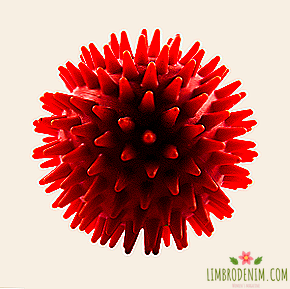How I went to the USA to look for a way to fight cancer
I graduated from the Department of Molecular Biology Biological Faculty of Moscow State University in June 2015 with a red diploma. Of the twelve people in my group, five went to study and work abroad, including me — that is, slightly less than half. Two of my classmates went to England, one to France, one to Germany, and I to the USA. It seems that no other department left so many people during the first year after graduation.
The Department of Molecular Biology has always focused on modern science. Training materials are updated to go, if not in step with progress, then at least immediately after it; teachers have relevant ideas about research, and students are interested in learning. All my former classmates are now continuing research activities, both abroad and in the laboratories of the RAS research institutes. The department has always trained excellent specialists - but how long it will last is difficult for me to judge.
What is wrong with science in Russia
To want to leave and be able to do it is different things. Since I began to study science, departure for me has been a resolved matter. Over the years of studying at the best university of the country and working in a truly wonderful laboratory, I realized that in Russia it is possible to do good science, but it is difficult. It is difficult not only because of funding, but also, as in many areas, because of the interaction between people and social institutions. Bureaucracy, unpredictable state innovations and interventions, long wait for reagents and equipment from abroad, insufficient cooperation and just communication between scientific groups (both foreign and Russian) - all this can not but influence.
All this affects the attitude to our articles in foreign journals: there is an opinion that the work of the same level from the Western laboratory will be published with greater probability than from the Russian one. At the same time, the success of a scientific career is largely determined by the quality of journals in which you show the results of your work. In the Russian atmosphere of self-isolation and cautious attitude towards others, I am afraid that science will be bent the fastest. I have great respect for my former colleagues and scientists who decide to do science at home. I just did not want to waste time and energy in the struggle for the right to engage in my work.
Should I leave and why
If you are thinking about emigration, then it seems to me that the sooner you leave, the better. Scientific emigration has its subtleties. First of all, you should understand that after graduating from graduate school or having worked after receiving a degree in a good laboratory in Russia, you will be in a better position than if you leave for a relatively poor laboratory abroad. It is possible to determine that the laboratory is good by the presence of fresh publications in journals with impact factors greater than 7-8. The impact factor is an annually updated characteristic of a scientific journal, which depends on the number of citations of articles published in it; the more reliable, more important and interesting the article, the more they are quoted.
What really matters when choosing a graduate school or a place for research is whether it is interesting to you to study the chosen subject at a particular institute. It is necessary to find out how things are going with its study in the institution and what recommendations can be obtained after. Nepotism, when it is easier to get an acquaintance than a set of merits, is characteristic of the entire global scientific community. Whether your career will succeed depends, among other things, on your social skills: on how well you can build relationships with colleagues, on useful contacts, on whether you can get recommendations from well-known scientists.
Just bearing in mind all this, it is worth making a decision whether to leave or stay. If you want to work abroad in a pharmaceutical or biotechnology company with time, or, say, engage in a startup, then graduate school or work experience abroad is probably the best solution - there are more opportunities to make useful connections, you can settle in a country with a healthier business climate. If over time you want to go to the United States, then it is better to finish graduate school in the United States.
People of any profession often fantasize about emigration for a "good life." In our case, this is especially dangerous: wherever you are, modern science is an endless "rat race" for publications, grants and new publications. These are irregular working hours, a highly competitive environment and wages, often not corresponding to the forces and years that you spent on education. When you spend the absolute majority of time in a laboratory that is equipped at a minimum level for the present, you will hardly notice any differences, whether you are in Moscow, Cambridge or New York. The more you are exposed to stress and the less willing to sacrifice a healthy balance between life and work, the more cautious you need to approach the decision to do science in general.
How I enrolled in a foreign graduate school
By the beginning of my last year at university, I decided that for now I want to stay in science and that I want to get a PhD (Philosophy Doctor - an analogue of a PhD degree in Russia) abroad. I began to search the Internet for good PhD programs that would finance my postgraduate studies and life abroad. I was guided mainly by the QS World University Rankings, where you can select the subject of interest.
In order to apply for most programs, you must fill out an application on the Internet before a certain date and collect a package of documents: most often it is a document certifying your last degrees (diplomas, bachelor, master) and / or translation of grades and hours for all subjects your specialty; motivation letter, resume, certificate of good knowledge of English (IELTS, TOEFL) and two or three recommendations. For American universities, you must also pass a special GRE exam - something like a general education test for graduates in mathematics and English. All these exams can be passed in Moscow, there are a lot of manuals for preparing for them and information about various intricacies on the Internet, and after a month or two of preparation it is quite possible to get decent points.
A motivation letter is an essay on 500-1500 words in which you have to show that science really fascinates you, tell about your scientific interests, about what you want to do in postgraduate school and after it, and why you are the best candidate for this particular a place. As for the recommendations, the higher the academic title and the more obvious the scientific success of a person (number of articles, Hirsch index, awards and prizes), which gives you a recommendation, the better. In order to get at least three good recommendations and significantly improve your resume, I advise you to go to overseas internships as much as possible - on holidays and in any free time. There is a lot of information about them on the Internet, for example, there is a wonderful group VKontakte. But first of all, you need to take a responsible approach to choosing a laboratory in your homeland: a set of skills that you will receive during term papers and dissertations, good relations with colleagues who have already been scientists, and the possibility of the first publication is the foundation of your scientific career.
When we chose laboratories for the first term papers, I managed to get to the laboratory of regulation of protein synthesis at the Research Institute of Physical and Chemical Biology named after A.N. Belozersky MSU. This is one of the best laboratories in Russia that investigate translation - a fundamental biological process for the production of proteins by living organisms. Thanks to my coursework and the support of my supervisor in the summer between the fourth and fifth courses, I won an Amgen scholarship and went to England, to Cambridge, to the laboratory of the Nobel laureate, who also studies translation. This was my first experience abroad. I realized that, firstly, my skills and knowledge of English are enough, and secondly, that good laboratories abroad usually consist of more than half of the emigrants and I can easily fit into such a group.
In the fall of the fifth year, I applied to all the places that seemed worthwhile to me. In America, I chose only three - for an application for each American program you give from 50 to 150 dollars, which will not be returned to you, regardless of whether you are invited for an interview or not. In addition, funding for foreign students is limited and the competition is very tough. If you pass the preliminary qualifying stage, you are invited to an interview and pay for the road or you are interviewed via Skype. Programs announce results at different times, and the deadlines for submitting applications are also different. Usually the higher the level of the program, the earlier the deadline. You will learn that you have not gone somewhere, in time to have time to submit applications for programs with candidates weaker, and so on.
Eventually, I entered the Cold Spring Harbor Laboratory (CSHL) PhD program and in August 2015 I left here. CSHL is a cult place where dozens of major conferences are held annually in the most rapidly developing areas of biology, to which eminent scientists come. The institute is an hour away by train from New York, in a very picturesque place on Long Island. Unlike many other American PhD programs, this term is limited to five years, which protects against the classic horror stories about graduate students who cannot get a degree of ten years. I graduated from semi-annual postgraduate courses, passed the necessary exam (local equivalent of the candidate minimum) and then began my dissertation. The knowledge gained at the university was enough for me to study on a par with classmates.
What I do
The topic of my dissertation is the search for new genes on which the development of cancer tumors depends. We use the CRISPR genome editing method - to put it simply, we turn off certain proteins in cancer cells and see how this affects them. I have my own project, on which I work alone, but we regularly discuss and plan experiments with the head of the laboratory - my supervisor. I report the results of the work to him personally and in laboratory seminars once every couple of months.
In general, emigration is not easy. If you live in a different country for a long time, you begin to sharply notice differences in culture and mentality, social, economic and political structure. Of course, abroad you are torn out of the usual environment, the difference in time and lifestyle gradually separates you from your relatives and friends, and it is very difficult to maintain the same level of communication. In this regard, my profession, by the way, helps, because the absolute majority of graduate students and researchers around me are the same immigrants and we are all in a similar situation.
Here, a lot of time is devoted to networking - you need to try to establish informal relationships with colleagues, and the more people from your line of business you know, the better. They arrange some small parties so that people from one area communicate with each other outside of work. On the one hand, there are no problems with making friends, but on the other hand, the word "friend" here does not have such a sacred meaning as in Russia. Here people can communicate with each other a couple of times - and already consider themselves as friends. There are no problems in order to make useful contacts or just to communicate with people - all are very friendly and open, easy with them. But deep friendships are not so easy to make. Due to the fact that people are easier to relate to themselves and to each other, you cannot expect from them the same things that you expect from friends in Russia. Abroad, it was always easier for me to communicate with people much older than me - they were closer to me in relation to life. It seems to me that young people in Russia are psychologically older.
The rhythm of my life has changed. The first thing that changes when you move, is the attitude to the road. In Moscow, getting to the university for an hour and a half was perfectly normal - I did this all five years. Now we live an hour from New York, and it's very hard to drive this hour. Most live fifteen minutes from work.
We all have a very free schedule: no one expects you to be at work from nine to six, you come and go when you want. To work on weekends or stay up late, I had to get a special permit at my Moscow institute. Here, as in Cambridge, everything is open around the clock. If you want to work at three in the morning, please, no one will say a word to you.
Due to the fact that I live in the American suburbs, here, firstly, it is impossible without a car, and secondly, the rhythm is very different, even if you have a car, this is not a city. In Moscow, it was possible to finish work and go to a bar. Here, the balance between work and life shifts much in the direction of work, simply because after it there is nothing to do: it takes an hour to get to the city, and this is already exhausting, you quickly lose the pace of long trips.
I live now with four classmates. Long Island lodging is very expensive, and we are renting a house of five of us - although we have a house with a pool. In general, PhD is difficult from the psychological point of view, because you have too many qualifications for any unscientific activity, and in science you will not be paid for your knowledge and skills, time and effort spent as much as you would have been paid elsewhere . We are now 23-25 years old, and some are beginning to think about how to start a family, take a mortgage and make ends meet - many of them are sad.
We all have to be prepared for the fact that we have to work on weekends or stay up late: the experiments that we carry out have a certain time frame, and they cannot be shifted at will. But even if you are not engaged in experiments at the moment, this is a field of activity where you need to read articles all the time and self-educate yourself. This is tedious, and one of my classmates begins to doubt whether it is worth it. But I myself have never put my decision into question, because I have no idea how I could do something else.
I still can not say that I have finally adapted to life here. Only six months later I received a Social Security Number (SSN), which allowed me to start a credit history. Without SSN and credit history, many areas of local life are suddenly inaccessible: for example, you cannot insure a car (and public transport on Long Island is absent in principle, and you need a car just to buy groceries). To get around these and other pitfalls was worth the nerves. I didn’t have any particular expectations from departure: I knew that it would be difficult - and it happened. There is enough bureaucracy and propaganda here, as in Russia.
I was invited to the program for five years, now it is the second year - there are still three and a half. If I get a PhD in three and a half years, I will look for a job, first in science - this is called postdoc, postdoctoral fellow. In fact, I am not an ideal candidate for a job in the USA, because I am not even an immigrant, but a citizen of a foreign state. If I wanted, like some of my classmates, to go to work at a pharmaceutical company, I could not do this - in America, work visas are issued according to the competition system, this is a lottery, the results of which do not depend on anyone: 30% receive a work visa. The company sponsors you regardless of the result - of course, it’s more profitable for them to take someone who does not need to participate in the lottery. If I remain a postdoc, it will be easier for me to get a work visa. Only after you receive it, the visa history begins to accumulate in order to apply to the green card. At the same time, I am not sure that I will definitely stay in America: I do not care where I live, the main thing is that it is good to do science in the country.





